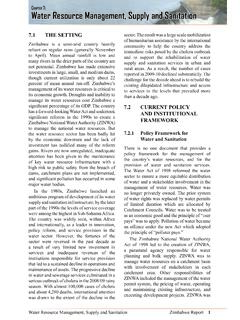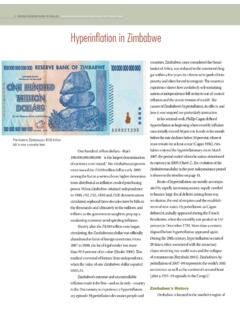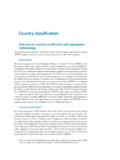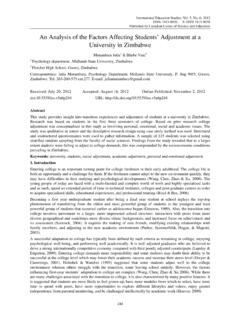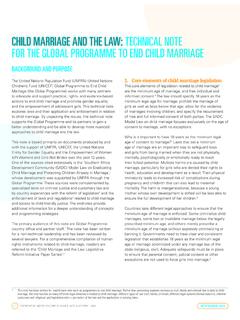Transcription of Social Development in Zimbabwe - dfzim.com
1 Social Development in Zimbabwe Discussion Paper prepared for the Development Foundation for Zimbabwe By Dr Tendai Murisa December 2010 Dr Tendai Murisa is a Zimbabwean with extensive experience working on various projects aimed at improving pro land and agrarian policies in Africa. He has worked on programmes which advocate sustainable and equitable agricultural Development on the continent. He has a doctorate in Sociology from Rhodes University in South Africa. He is currently based in Zimbabwe . Excerpts from this paper may be reproduced in any form following the usual conventions and specifically on condition that the source is cited and there is no misrepresentation of the data.
2 Views expressed in the report are those of the author and do not necessarily represent those of The Development Foundation for Zimbabwe 2 Outline INTRODUCTION .. 3 BACKGROUND: Social ASPECTS OF THE MULTIFACETED CRISIS .. 4 THE POST 2000 Social CRISIS .. 6 Limited Access to Deteriorating Health Services .. 6 Increasing Poverty and Household Food Insecurity .. 7 Urban Housing Challenges .. 10 Deteriorating Standards of Education .. 13 MAPPING INNOVATIONS FOR Social Development .. 15 Forging Progressive Social Development Partnerships .. 16 NGO and the 16 Mobilising Private Sector Participation.
3 18 Credible Baseline Research on Social Development .. 19 Sector Based Recommendations .. 20 Improving Health Delivery .. 20 Household Food Security .. 20 Housing .. 21 CONCLUSION .. 22 REFERENCES .. 23 3 Introduction Zimbabwe has in the past 10 years dominated international headlines for a number of reasons; the worsening conditions of poverty, a land reform programme that did not adhere to acceptable norms of transfer of property, contested elections and the general decline in the economy. Beginning in the late 1990s the country experienced an economic decline that has eroded livelihood capacities of both the urban and the rural population.
4 Various analyses have discussed the nature of the crisis from various backgrounds with different emphasis and ideological leanings. Although there is some consensus on the nature and scope of the economic decline and its effects on Social Development there is no agreement amongst scholars and even policy practitioners on the causes of this crisis. The failure to comprehensively grasp the interrelated factors that led to what can be called Zimbabwe s tipping point have also led to the formulation of inadequate policy interventions to respond to the crisis that ensued.
5 There was a coincidence between the beginning of the new millennium and the beginning of what in journalistic terms if regarded as the Zimbabwe crisis -this is shorthand for a very complex process of state failure. In fact what was referred to as the Zimbabwean was a three dimensional interrelated form of collapse which included the political crisis centered on increasing tendencies of authoritarianism on the part of the state and supporting structures. This was compounded by contestations around election results and the rule of law in general. The other critical dimension to the crisis was the economic meltdown whose causes are multifaceted; ranging from economic mismanagement on the part of government to structural constraints within the local economy and also the international economic system.
6 It is estimated that the economy has shrunk by over 30% since 2000 (Moyo and Yeros, 2007). Inflation accelerated through 2006, and by 2007 the country was officially experiencing hyperinflation, with prices rising more than 50% every month (Scoones, et al, 2010:26). This continued through 2007 and 2008 with inflation peaking at 231m% towards the end of 2008 (Chimhowu, 2009). Unemployment is said to be at 70%1. The third dimension of the crisis is the collapse of Social service delivery (the subject of this paper). Zimbabwe had by 1990 achieved impressive results in the area of primary health and education for all and had become the envy of many other post-colonial states.
7 In the area of 1 The methodology to measure unemployment is highly contested in Zimbabwe . Figures being released by different agencies do not include those in the informal sector and also rural farmers. 4 food security, the country had been assigned the responsibility of ensuring that there are enough food stocks within the sub-region by the SADC hence the term the bread basket2 of the region. By the close of the 1990s studies of the outcomes of land reform carried out by the Zimbabwe Household Dynamics Study (ZRHDS), led by Bill Kinsey showed how resettled farmers real income had more than doubled over the period between 1982-83 and 1994-5 (Kinsey 1999).
8 These positive trends in food security, health and education delivery were soon to disappear with the onset of the crisis decade . The purpose of this paper is to provide a contextual overview of Social Development in Zimbabwe through an analysis of performance trends on the part of the state in ensuring the delivery of the 3Hs (health, housing and household food security) and education. Such a task is very unenviable to any researcher given the broad issues that have to be discussed compounded by the unavailability of reliable statistics and also the limited access to the relevant studies carried out by others.
9 Whilst Social Development has been a favourite subject of international media, academic and editorial comment, there has been glaring and in most cases complete lack of empirical data. The scarcity of empirical evidence in the analyses tends to lead to the generation of generalisations which do not necessarily contribute towards comprehensive policy responses. The DFZ s long term objectives in intervening in this sector as spelt out in the terms of reference for this paper and also in other documents need to be informed by rigorous research and this paper can only map the agenda for such research and dialogue.
10 The paper is based on secondary data (including grey research papers), formal and informal interviews with government officials. It has also benefitted from the more than 5 years of research material gathered by the African Institute for Agrarian Studies who have generously allowed use of their resource center. Background: Social Aspects of the Multifaceted Crisis There is emerging a school of thought suggesting that we should let bygones be bygones and work towards a new Zimbabwe . This is akin to the reconciliation promoted by ZANU (PF) at independence with the oft quoted speech.
